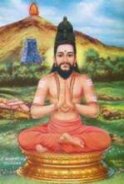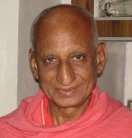

THE ESOTERIC
KANDAR ANUBHUTI
OR
THE SECRET TEACHING ON
GOD-EXPERIENCE
(A Treatise on Adwaitic Realization)
OF
SAINT ARUNAGIRINATHAR

 |  THE ESOTERIC KANDAR ANUBHUTI OR THE SECRET TEACHING ON GOD-EXPERIENCE (A Treatise on Adwaitic Realization) OF SAINT ARUNAGIRINATHAR |  |
 | by N.V. Karthikeyan |  |
| verses contents 23 24 25 26 27 28 29 30 31 32 .. 38 this verse in PDF version (6 parts) p-1 p-2 p-3 p-4 p-5 p-6 complete download of this book |
VERSE-28 ஆனா அமுதே அயில்வேல் அரசே ஞானாகரனே நவிலத் தகுமோ யானாகிய என்னை விழுங்கி வெறும் தானாய் நிலைநின்றது தற்பரமே.Aanaa amuthe ayilvel arase, Jnaanaa karane navilat thakumo Yaanaakiya ennai vizhungi verum, Thaanaai nilai ninrathu that parame. O Imperishable Nectar Divine! O King with the sharp Vel! Commentary Even when the seeker was driven to the utmost point of helplessness, being an undaunted aspirant, he continued his Sadhana with the power of his Guru's Initiation, and also desperately appealing for the Lord's Grace in 2 consecutive verses (verses 26 and 27). And the Grace of God comes in a manner astonishing to the seeker himself. His mind which was unable even to think of God (verse-23) and was disturbed by memories of past sex enjoyments (verse-24) and was forced to run about here and there taking interest in family and mundane matters against his will (verse 25), and was assailed by his past Karmas (Avidya or Ignorance, 'Ariyaamai') is graced with such deep meditation that it touches the fringe of Cosmic Consciousness. What is not possible with Divine Grace! This is a marvellous verse which graphically describes the progressive stages in real meditation, which the seeker enjoyed after such a long ordeal. Now he has successfully passed through the ordeal. He is able to meditate to his heart's content without distractions and he has different experiences in meditation, in stages. Of course, these stages do not come in one day. They are the progressing stages experienced in his mediation when practised regularly over a period. Broadly speaking, the meditating-mind or Jiva-consciousness experiences three stages before it enters into a kind of lower stage of Samadhi, as if touching the fringe of Cosmic Consciousness, or God or Self. First stage: ('Aanaa Amuthu' -- ஆனா அமுது -- "Imperishable Nectar") -- Meditation starts with duality (Dwaita), i.e. there is the meditator and the Object of meditation, or the mind as the meditating consciousness and God/Self as Satchidananda (perennial nectar or a mass of Bliss) ('Aanaa Amuthu' -- ஆனா அமுது) on which meditation is done. Real meditation is sweet like nectar. The meditation is so blissful that one will never get satiated, i.e., one wants to continue more and more. This is in contrast with the fleeting pleasures of the senses which become boring and nauseating after some time, wearing away the senses and causing debility, anxiety, diseases and sin. But to a devotee or seeker of Truth thought of God or meditation is a source of unending joy; it is life-giving nectar. The mind that thinks of God gets more and more absorbed in Him, and He is experienced as Divine Nectar, which becomes sweeter and sweeter as one goes on tasting it. More intense thinking of God leads to more absorption in Him. The joy of contemplation on God is so sweet that the devotee does not want to forget Him even for a moment. So it is said as 'Aanaa Amuthu' -- ஆனா அமுது. At times, the Sadhaka forgoes his meals and even sleep to enjoy the bliss of meditation. When this meditation deepens, by prolonged practice over a period, it goes beyond the dualistic feeling of the meditator being separate from the object of meditation. Second stage: ('AyilVel Arasu' -- அயில்வேல் அரசு -- "King with the sharp Vel") -- The Vel represents Wisdom and is often identified with the Lord, who is an embodiment of Wisdom. The Vel rests on the person of the Lord; it is almost inseparable from Him, yet it is not one with Him. Similarly, in the second stage, the meditation becomes so deep and the mind very subtle and pure as to feel very close to God/Self that he is neither one with nor different from God. The Jiva rests on the Self, like the Vel on the Lord, but not yet merged into it. Thus the dualistic idea of the first stage is transcended into that of "neither one with nor different from," (Visishtadwaita). The Vel (Spear) has a long stem and its leaf is broad in the middle and sharp at the top. The meditative consciousness in the higher reaches of meditation is like the Vel - deep in thought, broad in vision and sharp in understanding. The joy that was experienced in the first stage draws the Jiva more and more to the Self, and the soul longs for a deeper experience and gets closer to the Self such that it now rests, as it were, on the latter. The collected, pointed, and totally concentrated mind gets so much absorbed in meditation that it feels a kind of nearness and oneness with the Self; it almost becomes one with the Object of meditation, though its individuality is still there, even as the Vel is with the Lord. This is the second stage. When that meditation deepens by uninterrupted and dedicated practice, the third stage is reached. Third Stage: ('Jnanaakaran' - ஞானாகரன் -- "Wisdom-Mass") -- Then comes the third and highest stage in meditation, in which the Lord is experienced as "Jnaanaakaran," i.e., an embodiment of Wisdom, an ocean of Satchidananda. The perfectly concentrated mind, which in its essence is also consciousness, due to prolonged resting of itself on the Self in meditation, is about to merge itself into its source, the Self (Atman or Universal Consciousness) that is the substratum for all Jivas. It is like a river at the confluence. When the river is about to enter the ocean, at the confluence, it exclaims, "O how huge is the ocean; water and water alone everywhere!" But, before it could understand or try to say anything about its further experience, it is totally mingled with the ocean, it has lost itself and can therefore say nothing. The river has become the ocean itself and the question of saying anything about the ocean does not arise now. Even so, is the condition of the Jiva in that final experience. The Jiva that is close to the Self (stage 2), when it deepens its meditation, is like the river at the confluence of the ocean. The Jiva exclaims, "Jnaanaakarane" - O Embodiment of Wisdom! - "O, it is Light everywhere, on all sides!" And before it could know anything further, it is lost in that Mass of Light. Hence, after saying, "O Embodiment of Wisdom," the seeker exclaims, "Can anything be said (further)?" When this stage is attained, the meditating consciousness is lost in, or over-powered by, God/Self, as it were, and the Self alone remains, as a Mass of Infinite Knowledge ('Jnanaakaran' -- ஞானாகரன்) (Adwaita). What happens further is indescribable, because the Jiva-consciousness or I-consciousness which regarded itself as the 'Me' or 'meditator' gets swallowed up ('Yaanaagiya Ennai Vizhungi' -- யானாகிய என்னை விழுங்கி) by 'THAT', i.e. the Supreme Reality, which Alone remains as Mere Existence ('Verum Thaanaai Nilai Nintra athu Tarparam' -- வெறும் தானாய் நிலை நின்ற அது தற்பரம்). In the first half of the verse, the seeker gives a description of the three progressive stages in meditation even as he was experiencing them at that time, and so they are in the present-tense. He could not 'say' anything further as he has been swallowed up by THAT. And so the experience of the second half he gives in the past-tense, as it is a recollection of that Grand near Samadhi experience after his return to normal consciousness. He gives a glimpse of what the Grand Experience was like, as also the experiences that preceded it, so that struggling souls may know, when they have similar experiences, that they are proceeding on the right path and are approaching that Grand-Experience. The closest experience in our daily life of விழுங்கி - 'Vizhungi' - 'Swallowed', is that of deep sleep, which can explain, at least to some extent, about the above-mentioned experiences. When we want to go to sleep, we first lie down on the bed, slowly withdraw the mind from all the limps, and the withdrawn (concentrated) mind enters into the heart which is its abode. Upto this, we know what happens to us. Then we fall asleep, not knowing when and how we slipped into sleep. When we are asleep, we know nothing, as we are in the causal body, the store-house of the Sanchita Karmas, which is Avidya or Ignorance, Tamas or darkness, in which we are drowned or by which we are over-powered. We are not dead then but are alive, we have consciousness or awareness, but yet we do not know anything. Why? Because, the consciousness/mind/ego is enveloped by or 'drowned' in (விழுங்கி) Tamas (ignorance) or darkness. So, we know, because the mind or consciousness is there; but we know 'nothing' because the mind is enveloped by darkness. It is like a man with wide open eyes in a totally dark room. He can see, as his eyes are open, and he sees, but sees 'nothing' because he is immersed in or enveloped by darkness. So also, when we are asleep, as the mind/ego/consciousness/awareness is there, we know but know 'nothing', because we are enveloped by or 'drowned' in darkness or Tamas. Even that fact that we know 'nothing' is not known at that time but only after waking up. So on getting up from sleep we say: "I was fast asleep. I knew 'nothing' (because there was only darkness). I was blissful." And so it is said in the past tense. Similarly in that Final Experience of near Samadhi, the meditating-consciousness is 'swallowed up' by the Supreme Reality Which alone IS. The meditator is over-powered, as it were, by the Supreme Reality which is Infinite Knowledge (ஜ்யோதி பிழம்பு) (ஞானாகரன்). This he could not know at that time but knows only after coming to normal consciousness, by way of recollection. Hence, the seeker says, in the past tense: யானாகிய என்னை விழுங்கி வெறும் தானாய் நிலை நின்றது தற்பரம். The Jiva-consciousness or I-consciousness which regarded itself as the 'Me' or 'meditator' ('Yaanaagiya Ennai -- யானாகிய என்னை) gets swallowed up ('Vizhungi' -- விழுங்கி) by 'THAT' ('Athu' - அது), i.e. the Supreme Reality, (Tarparam -- தற்பரம்) which Alone remains as Mere Existence ('Verum Thaanaai Nilai Nintra -- வெறும் தானாய் நிலை நின்ற). All this is a great mystery. Our explanation is only a feeble apology -- நவிலத் தகுமோ! Yet, it will give some idea about it. In the dark room, we are enveloped by ordinary darkness; in sleep, by spiritual darkness or ignorance (A-vidya); and in near Samadhi Experience, by Jnana or Vidya or Supreme Wisdom or Light or Infinite Consciousness -- all which mean the Supreme Reality. விழுங்கி - 'Vizhungi' - Swallow: It does not mean one thing is swallowed by another thing, like we swallow food. In the highest stage of meditation, when the meditating Jiva or I-consciousness experiences God as a Mass of Infinite Consciousness ('Jnanaakaran' -- ஞானாகரன்), it is enveloped by That or the Mass of Consciousness from all sides or becomes a content of That; and so the Jiva feels it is 'Swallowed' by That. 'விழுங்கி' - 'Vizhungi' -- Swallowing 'Me' which is the 'I', 'THAT' which remained as Mere Existence was the Supreme Reality. The word 'விழுங்கி' or 'swallowing' is very significant and implies that the ego (jiva-consciousness) was only 'drowned' in the Cosmic Consciousness but remained intact, as it's root-cause Avidya or Ariyamai was not destroyed, which will be disclosed in the next verse. Only in verse-42 it is categorically mentioned that Avidya is 'destroyed'. Here it is only a high level in meditation; it is not the final Samadhi or Superconscious State or Attainment of the Goal, which is categorically declared as 'Attained' in verses 42, 43 and 44. Many aspirants at this stage think they have attained Samadhi or God and stop their practices. Hence Swami Sivananda gives a warning and says: "At this stage many aspirants make the sad mistake of thinking that they have attained the Goal and stop their practices; they go about preaching and mixing with all kinds of people and eventually have a downfall. They should not stop but continue their practice till the Goal is reached." The prayer in verse-2 was for 'Ennai Izhanda Nalam' which is Liberation. Here it is only 'Ennai vizhungi' which clearly indicates that it was not Liberation but only a glimpse of Cosmic Consciousness, which of course is not a small achievement. Arunagiri refers to "Mere Existence" (வெறும் தான்) as "Adhu," (அது) in Tamil, which means "That." It is not 'He' or 'She', but 'That'. Our usual concepts of Gods and Goddesses as either being Male or Female are all transcended in that Experience Whole. Hence, the Saint denotes it by saying "That." That which is the Absolute, stands as Mere Existence. That is all. Nothing more can be said about it. It will be interesting to note here that in verse 13, it was seen that "Adhu" (That) itself is Murugan, is the Lord with the Vel, and is our Guru. The stages of experience mentioned in this verse as "Aanaa Amudhe - Ayil Vel Arase - Jnaanaakarane" are in the reverse order of the experience revealed in verse 13 as "Murugan - Thani Vel Muni - Nam Guru." This order in the two verses seems to have great significance and reveal certain truths: (1) Murugan and Jnaanaakaran stand for the Absolute - Advaitam; (2) Thani Vel Muni and Ayil Vel Arase denote oneness and yet difference - Visishtadvaitam; and (3) Nam Guru and Aanaa Amudhe refer to the disciple and Guru, and devotee and God, respectively - Dvaitam. Thus, in verse 13, it is God coming to the human level (as Guru); the Absolute manifesting itself in the relative plane - a descending order. In this verse, it is man raising himself to God's level, the relative or the Jiva experiencing the Absolute - an ascending order. The term "Adhu" (That) is used in both the verses; which, in the earlier case, becomes the Guru, and which, in the latter case, the Jiva becomes. The same experience as was had in verse 13 maybe said to be had now also, but it is had after due Sadhana or effort from the Jiva's side. We may say that while the former was "given," the latter is "attained." The experience was given to provide the needed incentive to strive for and attain. |
| contents 23 24 25 26 27 28 29 30 31 32 .. 38 this verse in PDF version (6 parts) p-1 p-2 p-3 p-4 p-5 p-6 |
| ... www.kaumaram.com ... The website for Lord Murugan and His Devotees முகப்பு கௌமாரம் அட்டவணை மேலே தேடல் home Kaumaram contents top search |
If you do not see Tamil characters or for 'offline' viewing, please install 'SaiIndira' fonts from Azhagi.com download Free Azhagi software |
Kaumaram.com is a non-commercial website. This website is a dedication of Love for Lord Murugan. Please take note that Kaumaram.com DOES NOT solicit any funding, DIRECTLY or INDIRECTLY. [xhtml] .[css] |